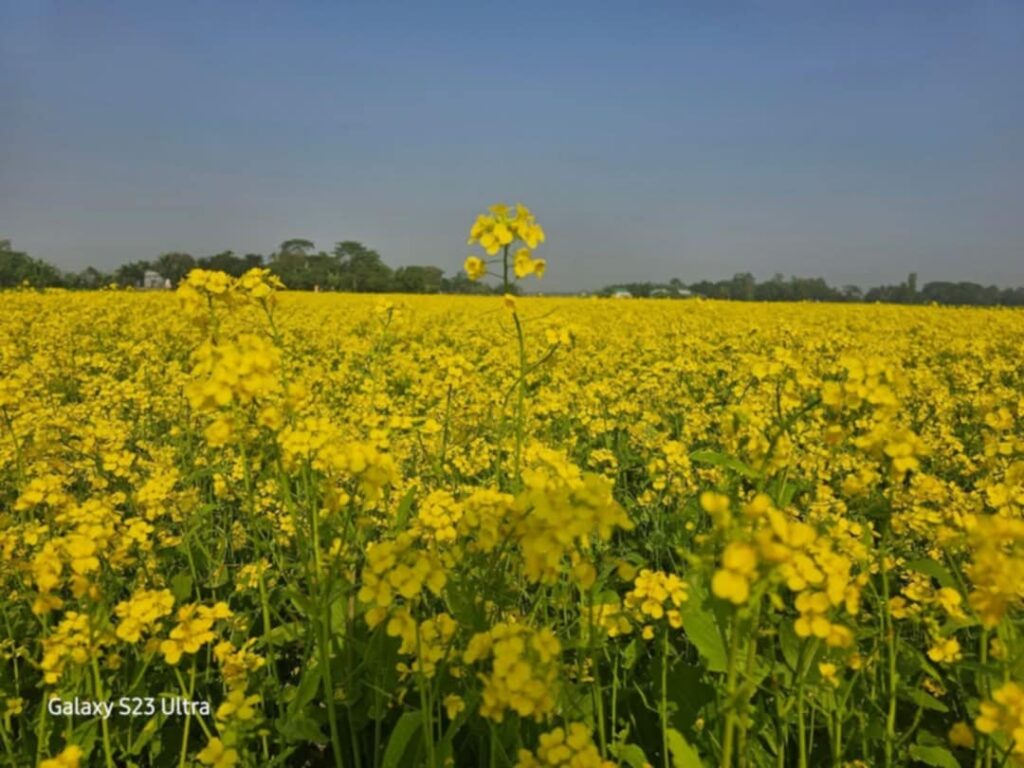Rangamati Correspondent
Farmers in Longadu, a hilly district of Rangamati, are delighted with the bumper mustard harvest. Farmers have achieved great success by cultivating mustard as an additional crop in just three months between the cultivation of Aman and Boro. This time, about 200 farmers in the upazila have cultivated mustard on 20,000 acres of land.
The farmer hopes to earn more than 15,000 taka per harvest, excluding expenses. While paddy cultivation is a costly affair, locals are making up for the loss of paddy by cultivating mustard at no cost. However, locals claim that if there were enough ghani to crush the mustard, the farmers would have been more profitable.
It is known that after harvesting Aman paddy, mustard seeds are thrown on the land with a ladder. Usually, mustard cultivation does not cost much. This time, the Langadur Agriculture Office has worked as a collaborator in mustard cultivation. Each farmer is given two kilograms of seeds along with a sack of fertilizer, a spray machine and other agricultural equipment. The crop has bloomed after two months from those seeds. Harvesting will begin from the end of this month.
According to the Upazila Agriculture Office sources, the highest amount of mustard has been cultivated in Longadu Sadar, Atarkachhara and other unions of the upazila. Mustard has been cultivated on about 20,000 hundred hectares of land in the entire upazila. Mainly, the Bari-18 variety of mustard has been cultivated here. This variety is high-yielding and also economical. It is expected to produce 6 kg of mustard per hundred hectares of land. Farmers expect a profit of more than 15,000 taka per kani of land, excluding expenses.
The fields are now filled with the beauty of yellow as the mustard tree blooms. It is as if a daughter of nature is dressed in a yellow wedding dress. The green hills are covered with the white smile of yellow mustard. Due to the extra profit, farmers have turned to mustard cultivation without leaving the land after harvesting Aman paddy. The harvest can be harvested in just three months. Currently, mustard is being sold in the market for 130 to 150 taka per kg.
Jumon, a farmer from Atarkachhara area, said, "The Upazila Agriculture Office has encouraged mustard cultivation. And provided all kinds of expenses including seeds, fertilizers, and agricultural inputs. This time we have cultivated it for free, and the yield has been good."
Upazila Deputy Assistant Agriculture Officer Shahidul Islam said that the government has taken a special action plan to reduce dependence on soybean oil and increase mustard cultivation. Under that plan, farmers are being encouraged to cultivate mustard and regular incentives are being given. Mustard is a profitable crop. Farmers get good profits with less labor.
Ratan Chowdhury, Deputy Assistant Plant Protection Officer of Langadu Agriculture Office, said, "Mustard is an additional crop. We can also call it a bonus crop. Mustard cultivation is increasing every year because of the high profit."
He further said that under the social responsibility program, this time Langadur distributed mustard seeds, fertilizers and agricultural inputs among more than 200 farmers. The Upazila Agriculture Office provided training to the farmers on mustard cultivation. The farmers are very happy as the harvest is good.
Longadu Upazila Agriculture Officer Zahidul Islam said that interest in mustard cultivation in the hills is increasing day by day. It is profitable with little care and little cost. Mustard cultivation is done between Aman and Boro rice. Farmers will plant Boro after harvesting this mustard. The money from selling mustard will cover the cost of Boro cultivation.
3/2/25


